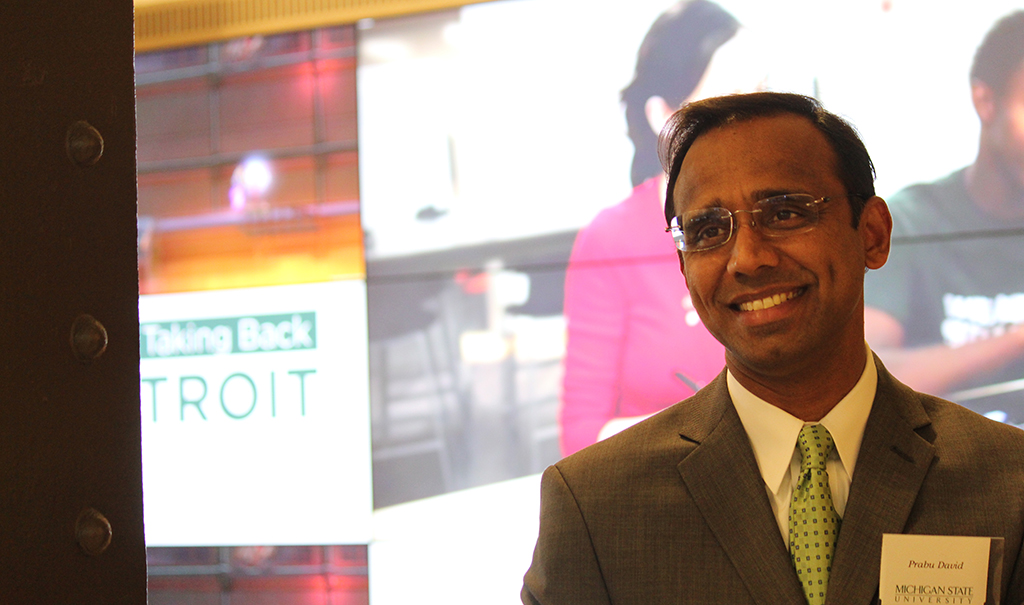
photo from MSU Today
Prabu David has people in the center of his vision. He aspires to continue to develop leaders and provide faculty and staff the space to be a “whole person.”
Central to David’s work in contributing to the academy are:
- Developing the whole person: How does one become a better person? This journey will spill over into the lives of those working at the institution. The responsibility for this is at the individual level, but reflection, commitment and self-regulation are paramount, all the while remembering no one can do it alone.
- Building the culture: Institutions should nurture people to become the best version of themselves and create an environment which enables people to do that by nurturing, respecting, and valuing virtues like generosity, magnanimity and humility. Leaders must recognize the value that different world views and disciplines bring. Translating our work for others outside of the university, including the public, is also key. We must explain to others what we do and get them excited about it.
- Creating more opportunities for collaboration: The joy of a far reaching campus like MSU is collaboration. Untapped potential exists in the office right across the street. MSU is an open and inviting place for collaboration, so we must ask ourselves how to take that to the next level. How do we create more space and more meaningful interaction with one another?
Establishing Trust to Build Culture
Leadership is often thought of in terms of “the C-suit,” or the upper levels of a corporate organization like the CEO, CFO, CIO, and others. The reality is that leadership is available at all levels. Decentralized leadership is empowering people to lead where they are. “One construct that I am really dedicated to is the value of trust and building trust,” Prabu explained. “I want to dedicate time to rethinking how we do work and how we engage with people.” It takes several types of leaders to really make a difference, and a large part of that will be understanding where leaders currently exist and trusting them to know how best to lead from where they are.
From where he is, David is looking forward to doing what he can alongside the president, provost and other leaders on campus who are excited to make a difference at the institution. “Commit to form the habit of trust, then follow through, do the right steps,” David said. “No human is perfect. No organization is perfect. Building that cycle into the institutional culture is a very important challenge and function of the new role in FASD.”
In order to enact such a grand vision at such a large institution, David points first to agenda setting and making trust a regular part of our dialogues and discussions, not only when things go awry. Leadership begins at the very top, and how much trust exists can affect our goals. “You can’t build trust with just words. Trust is built through interactions, actions and experiences,” David noted. Having served on many university-wide planning committees, he suggests:
- Acknowledging and making space for conversation about trust
- Surface key areas leadership, faculty and staff can make a difference
- Deliver on the promises in incremental steps and continue to show progress
To build trust, David hopes to focus on these areas:
- Untenured faculty / professors of practice. Teaching focused faculty often feel they are not part of campus in the same way as tenured faculty. There are feelings of a two-tiered system, which leads to disenchantment and a lack of belonging. It will be important to address this sentiment and create an environment where everyone feels included. By extension, academic and support staff contributions need to be considered. At an institution where individual and research accomplishments are consistently acknowledged, there needs to be a mechanism to recognize the work of academic and support staff.
- Academic specialists and advisors. They are the first responders at our institution who help students make sense of the challenges and stressors they are facing in higher education. Advisors and academic specialists need a scaffolding and support on campus where they can continue to grow and contribute to their fullest extent.
- Diversity, equity and inclusion in annual reviews. Documenting and talking about what we do in terms of diversity, equity and inclusion should be done in a meaningful way. This isn’t simply reporting what was done, but the why and purpose of what was done. Contributing to something that matters and provides a greater purpose and connection among our campus constituents is necessary to build trust.
As David continues to settle in his new position, he is putting people central to his vision for the university while building trust with leaders at all levels. When staff can feel free to bring their whole self to work, they are able to help create a culture and community of trust, inclusion and support.
Read the next issue to learn how to intentionally create space for conversations and develop people and workspaces that are enriching.
Review the previous issue to learn what it means to Prabu David, Ph.D.

